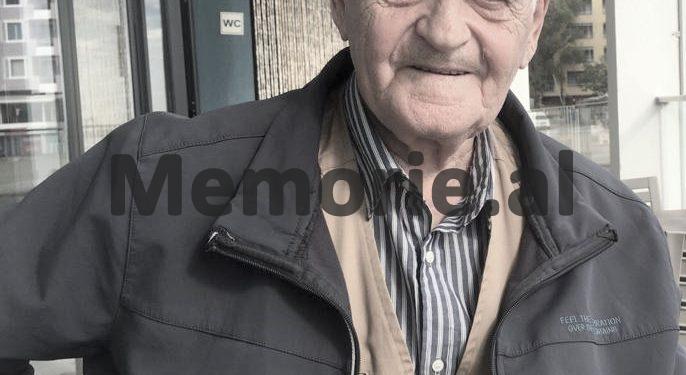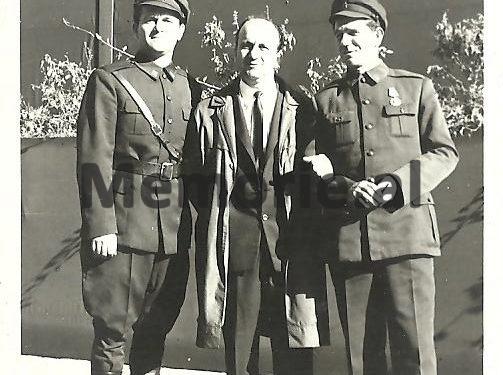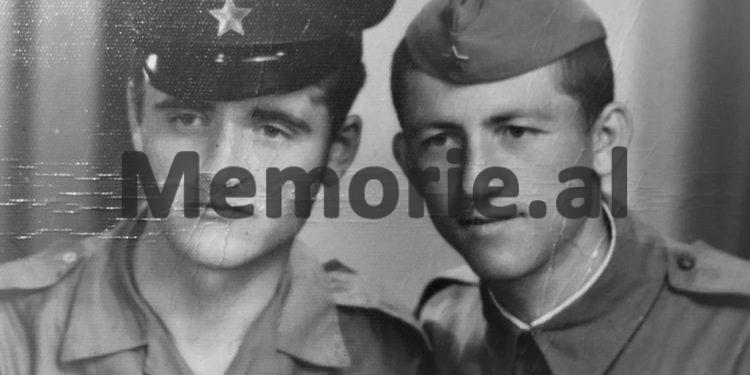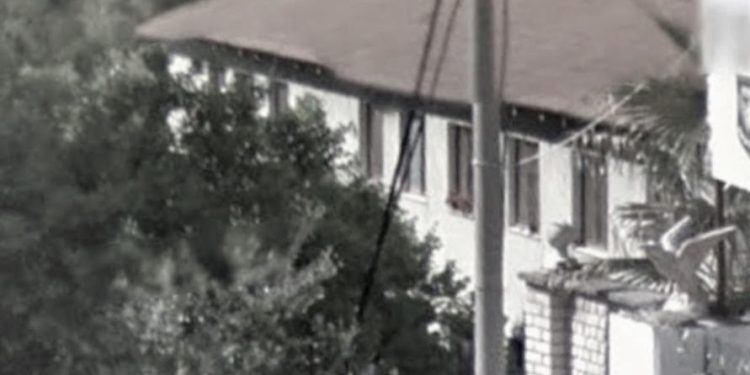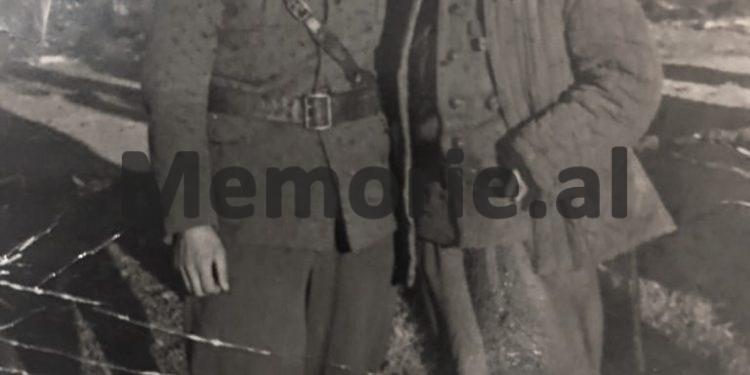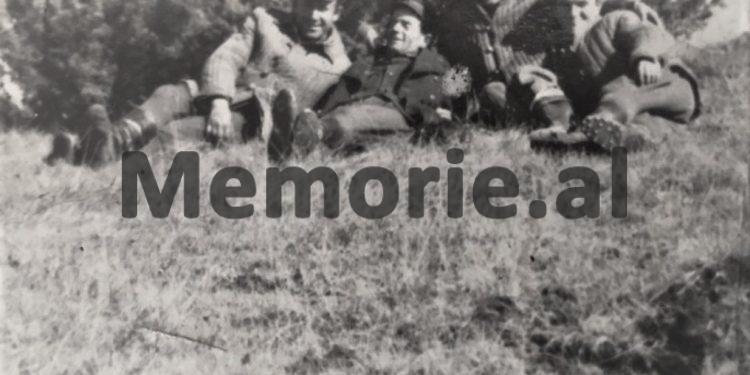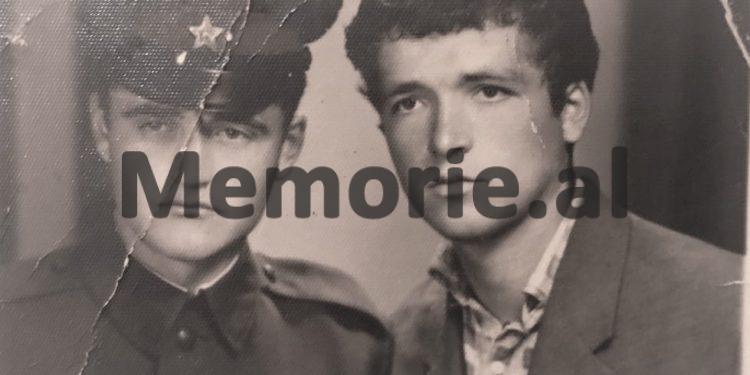By Dashnor Kaloçi
The first part
– Former officer of the Special Security Battalion of the Ministry of Internal Affairs, Halil Rrahmani, tells about the “highly secret services” that he personally performed in the years 1971-1991
Memorie.al / “Taking into account the fact that I myself served in the Tirana Prison (‘Ward 313’), as a guard officer, for the entire period of more than one year (1982-’83) during which the investigative process took place and judiciary of the so-called “Kadri Hazbiu Hostile Group”, I say with conviction that the former Prosecutor General of the Republic, Rrapi Mino, has not told the truth. He wanted to justify himself with what he said, since, during the entire period of time that we were present there, we heard screams from the convicts, which was easily understood as coming from the violence and torture that was inflicted on them. Likewise, from my fellow officers and various soldiers who served inside and outside the prison at that time, I heard that, after the trial against the “enemy group of Kadri Hazbi” (which took place inside the premises of that prison) ended , one day after the death sentences of Kadri Hazbiu, Feçor Shehu, Llambi Ziçishti and Llambi Peçini were heard from their cells, cries, shouts and screams were heard, such as: “O Enver Hoxha, help us spare our lives”, “O Hekuran Isai, help, spare our lives, don’t shoot us”, etc., of this nature. Likewise, to my knowledge, Kadri Hazbiu was taken out of Tirana prison dead on the night of September 9, 1983, and his corpse was then sent to the “Executive Committee” facility in Linza, next to the Security Battalion where were the secret tunnels where Feçor Shehu, Llambi Ziçishti and Llambi Peçini were shot, in the same place where Beqir Balluku, Petrit Dumen and Hito Çakon were also shot years ago”.
Mr. Halil, can you tell us something about yourself and how you managed to mobilize as an effective member of the Ministry of Internal Affairs at that time?
I was born in 1948 in the village of Shëmeri in the highlands of Tirana, where our family is from. Yes, in Shëngjergj, I finished the 7-year school (as the education system was then), while I finished high school in Tirana, after finishing the military service, in the Mechanical branch (without separation from work) at the “Partizani” gymnasium “.
Based on the fact that we had no biography problems, we were called a family with a good biography, on September 6, 1967; I was called up to perform mandatory military service and was sent to the Tropoja district, in the border area, to the Sulbica post office.
How long did you serve on the border and when were you discharged from the army?
I served there until May 22, 1969, when I was brought to Tirana, in Sauk, to complete a 6-month course as a border officer. At that time the course for a border officer was six months, later it became 9 months, then it became one year and gradually two years, and then three years.
Was it your request to attend the officer course, or were you selected?
I was selected to do the Border Officers course. The first was the good biography and the other side was the military preparation, during the time of military service in that border area, I had distinguished myself in the acquisition of the training program, both in theoretical subjects and in practice, during the training of the service. I was a soldier with good results, prepared from the military side as well as from the disciplinary side. I met all the criteria needed to go to that border officer course.
During the six-month period in Sauk, did you only do the theoretical side, or did you also do teaching practice on the border?
In addition to the theoretical part at the Sauk school where the commander was Gani Goxhi and Commissar Halil Pula, we also did teaching practice at the border, in Han t Hoti and Muriqan, which was conducted by some border officers of the Sauk school. Together with me in that course, Razi Xhihani from Kavaja, Nik Deda, from Tropoja, etc. was also there.
Where did you become an officer after completing that course?
We finished the six-month course at the end of December 1969 and after becoming a border officer, I was appointed to the post of platoon commander, in ‘Department 45’, located at the MCR (Civil Protection of Order) Command, near the Institute of Nuclear Physics, where there was also the Archive building of the Ministry of Internal Affairs, where for years now those buildings have been under the Ministry of Defense.
What tasks did ‘Department 45’ perform?
It was a Genio division with three companies of soldiers, which depended on the Ministry of Internal Affairs and the commander was Ilo Cristo. The task of that department was to carry out engineering works in objects of special importance and very secret, which the state had at that time, such as the tunnels of Kërraba, Skrapar, Selita in the highlands of Tirana, etc. All those tunnels and other military facilities, such as: the location of the Central Command of the Army, the tunnel for the deposit of the state’s treasury and monetary values, the Arshiva tunnel, etc., (some of which are still in working condition today functional), were built by that department.
Were other military or civilian facilities built by that department?
There were other facilities that were built by ‘Department 45’, such as the Liaison Department of the Ministry of Internal Affairs in Kërrabë, which was designed, assembled and commissioned by Chinese specialists. In 1970, our department moved and settled near the village of Linzë, about 2 km. further east, where at that time was the “Ulliri” facility of the Ministry of Internal Affairs. We were sent there to build the facilities of ‘Department 324’, which was the Security Battalion of the Ministry of Internal Affairs, a special department, which depended directly on the Minister of Internal Affairs, but as an intermediate link, was the command of the Ministry, with Commander Rrapo Demo and then Nikoll Shkurti. Ward 324, since it was created at that time, until the beginning of the 90s, would serve to carry out highly secret tasks of special importance, which the Ministry of Internal Affairs and also the Albanian state of that time.
What was the object “Olive” and what was it for?
The “Ulliri” facility was a two-story building that prepared the staff of the Albanian Political Discovery for abroad. It was the school where those people, who the state of that time sent on missions abroad, as scouts or on various secret tasks, learned and prepared.
Do you remember any of those who were preparing to go on missions overseas?
The “Ulliri” object was one of the very secret objects of special importance that the Albanian state had at that time and we of ‘Department 45’, (as well as ‘Department 324’ which was created later), had no connection with him. Our department was accommodated there for a short period of time and then we were removed from there and accommodated in tents, until the facilities of “Department 324” were built. A period of time was used, when there was no teaching, since the “Ulliri” facility did not function all the time like other schools, but with certain periods of time, according to the needs of the state, when preparing cadres to send them out on missions abroad.
The construction of the “Ulliri” facility in that place was done in order to keep it as hidden as possible from the eyes of the public and away from residential centers. That facility was extremely secure from all sides, bordered only by military units. Based on this, her two-story building was built in a place like a pit, in the middle of olive trees and bushes, its roof was barely visible, only from a road that passed somewhere above that led to the village of Linzë .
The entire “Ulliri” facility was provided with 24-hour service and was covered only by the officers of “Department 324”, where every door or window was sealed and checked and taken over, every time the service changed, every four hours. In the same way, the soldier who was on duty at the main gate of the “Ulliri” facility was on guard duty with a light machine gun, while the others were with “Kalashnikov” automatic weapons. But let’s face it; this had more of a psychological effect, since no one could approach, not to the main gate of the “Ulliri” building, but not even close to it.
When Nexhmije Hoxha came there for the first time to teach, she complained about the unpaved road with potholes. That same day, immediately after her complaint, an order was given and within eight hours, the Army Genius of the Ministry of Defense built a concrete bridge which shortened that road by several km. long.
Besides Nexhmije Hoxha, do you remember anyone else who came there to teach?!
A part of them who taught there came from the Higher School of the Ministry of Internal Affairs of Sauk, or from the Ministry, according to the relevant subjects they taught there, but from where that facility, or rather that school, was a secret state of special importance, even the cadres who taught there, came and left in closed vehicles, so that they would not be recognized and it would not be understood what they came for. Apart from Nexhmije Hoxha, who taught the subject of Marxism, I cannot accurately tell you any other name, since we only knew him as a face.
When was ‘Department 324’ built and what was it for?
‘Department 324’ was created in 1970-’71 and it was a continuation of ‘Department 45’, which, from the genius department, merged as such and became the “Security Battalion of the Ministry of Internal Affairs”, which was a special ward coded as ‘Ward 324’. This department depended directly on the Minister of Internal Affairs at that time, Kadri Hazbiu, and it became more or less like the “Security Battalion of the Ministry of People’s Defense” which directly depended on the Minister of People’s Defense at that time, Beqir Balluku .
The Security Battalion of the Ministry of Internal Affairs performed various secret and highly secret tasks, of particular importance, according to the needs that the Ministry of Internal Affairs had or presented at certain times. The commander of ‘Department 324’, since its creation, has been Dane Binaj, (who years later became the commander of the Guard of the Republic), while the commissar has been Flamur Arapi.
How do you remember its construction, after you said a little above that it was built by “Department 45”, where you were a platoon commander?
Due to the great importance of that Special Security Battalion of the Ministry of Internal Affairs, (which consisted of three companies and an autonomous chemical platoon), most of the facilities of that department, starting from the soldiers’ silos, the dormitories, the classrooms with the corresponding cabinets, the meeting hall, the canteen, the kitchen, the weapons depots, the rear depots, various annexes, such as the TV room, etc., were all built underground, with reinforced concrete tunnels, of high quality, which had an ample lighting and ventilation system. With normal living conditions, for sleeping, learning, etc., without having any kind of problem. Most of the buildings and premises of ‘Department 324’, for the two companies, the second and the third), as well as the autonomous platoon of Chemistry, were all underground, outside were some command offices, the vehicle park, the laundry , bathrooms, showers, sports facilities, etc.
The first company, where was it?
The first company, (‘Department 329’) or as it was otherwise known as ‘Motor Platoon’, was located in the center of Tirana, next to the Academy of Sciences, at its entrance is a stone wall gate with an arch. The deployment of that company there was to be as close as possible to the building of the Ministry of the Interior, which its operatives covered with 24-hour service. In addition to these, ‘Department 324’, there was another military point installed in Kodra e Rrashbulli near Shkozet in Durrës, which dealt with cigarette smuggling that was done by the Albanian state at that time and the soldiers there were in civilian clothes and with untidy hair. In that department which consisted of a platoon of soldiers, I served for six years as its commander, from 1985 to 1991.
Likewise, another military point of ‘Department 324’ was the object “Pillar” which was located behind Dajti Mountain, in Qafë-Mollë, near Feken, which consisted of several secret objects of particular importance, all in underground tunnels, where the Ministry of the Interior would be housed in case of war.
How and what were these other points for and what were the concrete tasks that ‘Department 324’ performed?
Before I tell you about the tasks performed by ‘Department 324’, or as the Security Battalion of the Ministry of Internal Affairs was known, I wanted to say that that department, together with the Guard of the Republic, was an elite special unit, not only of the Ministry of Internal Affairs, but of the entire Albanian Army, i.e. of the Ministry of National Defense as well. This thing, not only for the tasks he performed, but also for the living conditions that were created for him, such as the high-rate food treatment, the selected composition of his effective soldier and officer, the special training he performed, I mean here also winter camps in Feken and summer camps on the coast of Karpeni Kavaja, etc.
Where did the selection of the effective soldier and officer of that department consist?
The selection of the military personnel of ‘Department 324’ began in the Military Branches of the districts, first there were the biographical guarantees, then their training, education and behaviors at work and society, which they had before being mobilized, etc. were looked at. As for the cadres, the effective officer, in addition to the biographical aspect that was looked at in detail in some generations, military training, school results, etc. were also looked at.
What were the services and tasks performed by ‘Department 324’?
The Security Battalion of the Ministry of Internal Affairs, with its three companies, performed various services and tasks, of a secret character and of particular importance, these predetermined previously, or according to the needs presented to the Ministry of Internal Affairs Internally, at different times. For example, loading and unloading the monetary values of the ‘State Treasury’ and moving and accompanying it from one facility to another, such as in Kërrabë, Skrapar and the Central State Bank in Tirana.
Another task was securing, moving, escorting and transporting the archives of the Albanian state, from one object to another. The III company escorted and transported the monetary values that came to the Port of Durrës from the People’s Republic of China, and were sent to the relevant places, in Kërrabë, Skrapar, where the ‘State Treasury’ was kept.
All these special services, performed by the III Company, which was the most important of the Security Battalion, were also provided for in case of war. These types of services were not very frequent and the III Company, throughout the year, carried out intensive training in the ward and outside it, according to the schedule.
Did the III Company carry out other special tasks?
Yes, there were other tasks, but they were very secret and of a very special importance, and no one should know about them.
How were these tasks performed without even the command of the Battalion knowing…?!
The announcement came from the Ministry of the Interior for the command of our Battalion, where it was said that so and so soldiers were needed, with these characteristics, physically strong, to have this type of weaponry or personal equipment with them, in civilian or military clothing, etc., to who should be in front of the main door of the ministry building at this hour. After this announcement, the Battalion Command selected the soldiers from the III Company, who sent them to the Ministry of the Interior, according to the schedule that was assigned to them, and a person was waiting for them there, who took them into custody. To begin with, that person gave them the necessary instruction, assigned them the task or service that they would perform in Tirana or abroad, in ‘x’ or ‘y’ country, getting to know them in detail about the performance of the tasks. And after the service was over, for a day, two days, or more, they would return to our ward.
About all this, where they had been, what work they had done, whom they had met, etc., they should not speak categorically to either one. This was categorically stated, and no one, not even the superior officers of these soldiers, had the right to even ask where they had been. /Memorie.al
The next issue follows




